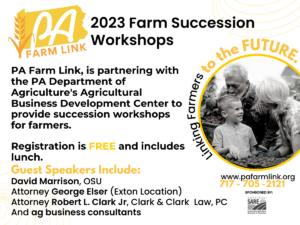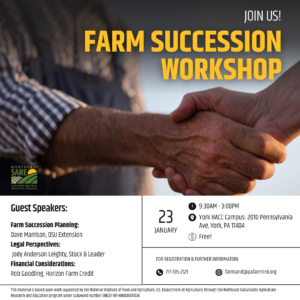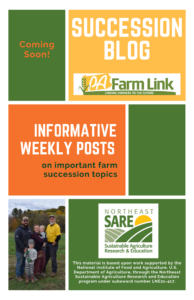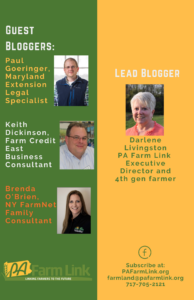Final report for LNE21-417
Project Information
2022 NASS Agriculture Census reported an increase in Pennsylvania farmers age of 1.7 years, from 53.7 in 2012, to 55.4 years old in 2022. The same census also reported 24,448 new and beginning farmers in Pennsylvania.
The actions of the 44,727 farmers aged 55 and over determine land opportunities for the 24,448 new and beginning farmers. Farm succession planning of Pennsylvania’s older farming population determines the success of Pennsylvania’s next generation of farmers.
The problem was similar across the Northeast region and around the nation. Therefore, the project partnered with ag professionals with farm succession expertise from Pennsylvania and surrounding states educating farmers on the topic and assisting with planning needs.
A multifaceted farm succession program combined virtual and in-person events, online resources and educational program recordings. The method ensured farmers had access to learning materials 24/7 when they had time to review them. Next generation farmers shared the recordings with less technology savvy family members which was an unexpected outcome.
Events connected farmers to experienced farm succession experts for assistance and continued support, providing a holistic approach to farm succession planning.
Blog posts served as topic reminders sharing farm succession information from ag professionals well versed in succession planning.
22 farmers from outside of Pennsylvania joining virtually were linked to qualified ag professionals in their state and/or region as requested providing a positive impact beyond Pennsylvania’s borders.
293 farmers reported increased knowledge and understanding of farm succession topics including, financials, business and legal aspects, communication, planning for the unexpected, and communication skills.
Farm succession planning process was not a fast or easy task, it took time to work through the various required steps, talk to family and those involved, discuss farm financials and enterprise changes that were required to develop a plan that worked for everyone. Each farm and family were different and required their own time frame to accomplish the task.
The continuation of events over a three-year period provided consistent education opportunities and encouraged farmers to continue the conversation, work through the process and develop succession plans for the farm. 64 farmers accomplished the goal, drafting transition/succession documents for their farm. Everyday farm activities and life interruptions slowed the process for other farmers who didn't complete the documents by the end of the project.
Consistent reinforcement regarding the importance of a plan for the farm kept farmers on track and moving forward even if at varying speeds. Connections to ag professionals ensured they had support to continue the process after the project ended.
Resulting in 64 farmers drafted farm transition/succession documents through succession knowledge gained and ag professional assistance providing succession security for 9701 owned and 3000 leased acres of farmland. Annually the farms contributed approximately $5,496,000 to the rural economy of the Northeast.
80 farmers will draft farm transition/succession documents as a result of knowledge gained through succession education and Ag professional assistance providing succession security for 8000 acres of farmland. Annually the farms contribute approximately $2,400,000 to the rural economy of the Northeast.
The 2017 NASS Ag Census reported a dramatic increase in Pennsylvania farm owners 55 and over. In 2017 there were 49.690 farmers 55 and over and in 2012 the Ag Census showed 32,950 Pennsylvania farm owners 55 and over. A staggering increase of 50.8%. During the same period of time the Ag Census reported Pennsylvania lost 425,776 or 5.5% of its farmland.
Focus was placed on succession planning in Pennsylvania, so the land successfully passes from one generation to another.
The project started with online options, combining a multifaceted approach utilizing a webinar, a blog platform, zoom meetings and in person workshops.
The webinars were well received with 280 participants. Many questions came in from participants with a common theme, a majority were legal questions. The questions and others were covered in blog posts, later webinars and workshops.
Cooperators
- (Educator)
- (Educator)
Research
Education
Year One
The project started off as planned with staff planning meetings, advisory committee meeting and communication regarding the blog platform and its incorporation into the website. All went as planned except for the website and blog platform addition. Upon further review it was realized the PA Farm Link website required updates in order to allow the blog platform to run smoothly. While the website upgrade was not a part of the SARE project it had to be completed before the blog platform went live. The website upgrade was completed by a very talented company, and they handled the blog platform and subscription set up.
Meanwhile outreach was completed with guest bloggers requesting they submit their first-year blogs. The process went smoothly, with high quality succession blogs received.
Promotional materials for the blog and webinar were created and distributed at trade shows and other outlets.
The farm succession webinar for year one was planned and carried out. PA Farm Link partnered with two state partners to ensure a broader audience. PA Farm Link obtained the presenters and finalized the farm succession presentation included in the webinar. Several planning zooms were held as well as a dry run to ensure the webinar went smoothly. Along with that news releases were developed and distributed via ag and community newspapers, enewsletters, social media and trade shows.
The webinar was held on January 31, 2022. Speaker, Brenda O'Brien, from NY FarmNet did an excellent job and was well received. The program had 117 registrants and 53 live participants. Two polls were taken during the webinar, and a follow up survey was sent as well as links to farm succession resources.
Year one went well even though there was a website glitch outside of the grant project that delayed the succession blog launch. PA Farm Link was happy with the results.
Year Two
Three farm Succession podcasts were carried out to keep the topic pertinent and active with farmers. The podcasts were completed in cooperation with AgChoice and Mid-Atlantic Farm Credit. Topics included a business consultant/financial specialist, farmer, and legal perspective of succession planning was provided by an attorney.
The blog was launched, and it featured several quest writers including webinar speaker Brenda O'Brien on a variety of farm succession topics. The live blog was promoted via trade shows, the PA Farm Show and ag conferences. It was also featured in Facebook posts.
Two hybrid farm succession workshops were planned. The hybrid format (including both in-person and remote options) was chosen because colleagues across the United States reported farmers were requesting both in-person and remote options for events. Technology specialists were engaged for the program ensuring everything ran smoothly for the hybrid model. The workshops took place on Feb. 23rd and March 1.
Promotional materials including flyers were distributed both electronically and hard copy. One ad was placed in the Lancaster Farming newspaper that was distributed at the PA Farm Show and ensured the highest readership. Facebook ads were developed and ran on social media. Materials were also shared with the Indiana County Conservation District, Indiana County Farmland Preservation and Penn State Extension Service as well as Ag Connect.
The project team had individual conversations with farmers who are either considering the topic or working on farm succession plans. Farmers were encouraged with next steps, provided Planning the Future of Your Farm workbook and appointments made to facilitate farm family meetings and/or referred to other ag professionals for assistance.
Year Three
Hybrid farm succession workshops were held in Indiana and Chester County. Farmer participation was good. We found that with hybrid events farmers didn't prioritize the in-person option and changed their participation method at the last minute. Future events were planned for either in-person or virtual participation but not hybrid. Colleagues in other states had the same challenge and also moved to in-person or virtual programs.
2024 farm succession workshop was quite successful with excellent comments and evaluation following the event.
2024 webinars were held. One featuring, Paul Goeringer, Univ. of Maryland Attorney "When it Goes Wrong: Learning from Others' Mistakes." The second webinar Business, Legal and Tax Implications of Succession Planning was presented by Attorney Jody Anderson Leighty.
Throughout the project, project team members met with farmers and facilitated family farm meetings and also referred farmers to the correct ag professionals to assist them with their farm succession planning and related documents.
Milestones
Farmers will hear about project activities and objectives via newsletters, press releases, social media posts, virtual or in-person trade shows and meetings.
2000
24
4680
175
August 31, 2022
Completed
September 16, 2024
Farm Succession workshop Press Release
To date program information was distributed via PA Farm Link's newsletter, PA Department of Ag newsletter, partner organizations, social media, Keystone Farm Show, Pasa Conference and PA Farm Show. News releases were sent to Pennsylvania newspapers. Example outreach is included below.
Farm Succession Workshop Flyer



They also learned about the various farm succession events including workshops, webinars, and decided to participate and/or shared with family and friends.
Farmers subscribe to and read the farm succession blog 2021 to 2024.
200
4
132
91
March 31, 2023
Completed
September 27, 2024
The blog site is public.PA Farm Link Blog | Educational Resources for PA Farmers
Succession blogs regularly posted.
Farmers suggest future succession topics through online submission form.
150
4
147
14
April 28, 2023
Completed
April 28, 2023
Future succession topics were requested from webinar participants following the January 31, 2022 farm succession webinar, 2023 and 2024 workshops, and polling results. The final results will be utilized along with continued polling results of farmers to determine future blog and workshop succession related topics.
Topics to date:
Legal:
Becoming an LLC
Estate Planning with farmland and buildings
Transition outside family (2)
Transition with several properties (2)
More on legal issues & topics (2)
How to transfer property (7)
Legal options (2)
Many very specific legal questions, relating to particular farms.
Financial:
Financial statements and how to use them to improve.
Financial markets
Commodity specific examples (livestock)
Equal vs Fair (6)
Compensating non-farm siblings
Taxes (5)
Financial items & Financials (9)
Developing financials for those who've used the shoebox approach.
Medicaid obstacle
Five Year Look Back (2)
Communication:
Working with various generations & understanding them.
2nd gen initiating the succession conversation.
More interactive activities, breakouts
General communication (3)
Other:
Ag preservation (4) and conservation
How to guides for beginning farmers.
During/Post transition
Insurance for farms
Transition in challenging situations, farming member with personal challenges. (2)
List of ag professionals who specialize in farm transition.
Finding the right succession team
Session for older and younger generation to brainstorm ideas.
Meeting facilitation (13)
Farmers referred to Ag professional for one on one succession/transition assistance.
110
8
115
32
January 31, 2024
Completed
September 25, 2024
To date three farmers have been referred to Ag Professionals for succession/transition assistance. The number does not include anticipated follow ups from the January 31, 2022 webinar.
Nineteen farmers have been referred to Ag Professionals as of Jan. 31, 2023 as well as several supplied with the Planning the Future of Your Farm workbook as well as other resources.
Farmers continue to be referred to ag professionals for assistance, 96 to date. The numbers should continue to increase as we follow up with participants from this year's events and calls and emails we receive. The farmers are normally provided with a copy of Planning the Future of Your Farm workbook and other related resources.
Farmers asked for referrals to ag professionals throughout the final workshop and webinar programs and were referred to appropriate professionals who would assist them with succession planning.
Farmers accept assistance from ag professionals and complete related farm succession documents
80
25
64
24
February 28, 2024
Completed
September 30, 2024
Reporting shows one is in the process of completing farm succession documents, others remain in the earlier stages of farm succession discussions.
Farmers are working on succession planning, and we continue to encourage and build networks for them such as at the upcoming workshops, along with financial and legal experts there will also be ag professionals from SBDC and Penn State Extension available to assist them and start discussions with at the events.
Farmers are working on succession plans and some of the ag professionals we refer the farmers to send them on to the appropriate professional to complete the document if they are not that person. We will continue to gather data and provide an update in the final report.
Farmers were working on succession plans but the process and progress was slower than anticipated as farm families worked through various situations and sought the best options. Time of year also slowed the process with action coming to nearly a standstill in the summer due to field work etc.
Farmers participate in farm transition/succession 8 webinars and zoom meetings, 2021 through 2023.
300
15
280
53
December 29, 2023
Completed
September 30, 2024
2022 webinar Succession Planning, Practices and Pitfalls had 117 registrants for the first webinar, with 53 live participants including 48 farmers and 5 ag professionals. It was recorded and made available to all the 117 registrants as well as others online.
98 farmers utilized the recording as well as 12 ag professionals.
Three podcasts were developed and aired to provide information to farmers remotely and in an easy listening manner. The goal was to help farmers understand the need for a succession plan and give them some information that would encourage them to begin the planning process.
February 17, 2022, Guiding Families Through Transition with John Black aired. Business consultant, John Black, discussed farm succession stumbling blocks, senior generation needs, adding new enterprises, and succession planning suggestions.
Reflections on Farm Transitions with Marlin Hartzler aired February 24, 2022. Marlin discussed hopes and fears transitioning farm from his grandfather. Transitioning from dairy to hogs and the benefits that were seen after a few years. He shared what he might have done differently and advice for other farmers during the succession of a family farm.
March 3, 2022, Legal Considerations in Farm Transitions with Attorney Jody Anderson Leighty aired. Jody shared the first step farm families should take, implication of taxes in Pennsylvania, implications of Medicaid and long term care to the family farm.
The podcasts were downloaded 84 times in the first three months of airing.
The two 2023 succession workshops were hybrid events with online and in-person participation. 15 farmer participants online, 5 ag professionals, 28 recording views and 17 in-person participants.
Topics of the two full day hybrid workshops included a general overview of succession planning and planning for unexpected, getting the financial house in order, communications with family and across the generations and legal aspects of succession planning. Here is a recording of the event.
Two learning modules were also created from the workshop recording. They were:
- Learning modules developed from David Marrison, Ohio State University, presentation. Farm Succession & Planning For The Unexpected | OSU Extension | PA Farm Link
- Learning module developed from Phil Taylor, Horizon Farm Credit, presentation. Farm Succession: Getting Your Financial House in Order | Farm Credit | PA Farm Link
2024 webinar, When It Goes Wrong: Learning from Others' Mistakes in Farm Succession Planning with Paul Goeringer, University of Maryland Extension Specialist. When It Goes Wrong: Learning from Others Mistakes in Farm Succession Planning, a webinar featuring Paul Goeringer from the University of Maryland. It covers crucial aspects of farm succession planning, learning through real-life case studies how to avoid common mistakes and ensure a smooth transition for your farm’s future. When It Goes Wrong: Learning From Others' Mistakes in Farm Succession Planning with Paul Goeringer
2024 legal webinar and learning module. An in-depth look at the essentials of legal farm succession planning, presented by Darlene Livingston and Attorney Jody Leighty. Through real-life insights, explore the best approaches to initiate family discussions, organize assets, and develop a feasible succession plan. The course also covers key legal structures, tax implications, and long-term planning essentials to ensure a seamless and legally sound transition of the family farm to the next generation. Business, Legal and Tax Implications of Succession Planning | Stock and Leader | PA Farm Link
Farmers participate in farm 4 transition/succession in-person programs, 2022 through 2024.
100
6
95
11
January 31, 2024
Completed
January 23, 2024
Two in-person workshops taking place Feb. 23 & March 1, workshops also available online to meet everyone's needs and preferences. The final ones later in the year.
The 2023 Succession workshops were hybrid events with online and in-person participation. 17 in-person farmers, 15 farmer participants online, 5 ag professionals and 28 recording views. Here is a recording of the event. 2023 Farm Succession Workshop - Indiana County - PA Farm Link (youtube.com)
We found by providing a hybrid option, farmers didn't make it a priority to participate in-person. Colleagues across the US have similar experiences. Therefore, future events will be either in-person or online but not hybrid, because overall there's less participation. We are establishing a new normal.
November 2023 a workshop titled Farm Family Communication Always Room to Improve was held, focusing on communication among family members and while working with various generations. Farmers discussed challenges working with both younger and older generations and were offered suggestions to apply to their family situations. Referrals were made to ag professionals to assist farmers with planning.
2024 succession workshop was held in-person only, was well attended and got excellent reviews, 35 farmers, 6 ag professionals.
The January 23, 2024, in-person farm succession workshop was held in York, Pennsylvania. Topics included farm succession and planning for the unexpected, farm succession financials, farm family communication and challenges, legal, business and tax implications of succession planning and breakouts determining and discussing the hopes and fears of each generation.
Milestone activities and participation summary
Participation summary:
Learning Outcomes
Final Evaluation-for-SARE-Workshop-2023-1.docx
Events were held from January 2022 through September 2024.
Data was gathered through surveys at the end of webinars and workshops, polls during online events, and through follow up surveys emailed, and snail mailed to participants as well as follow up conversations.
Data was also gathered during registration, and it was impossible to gather all data during registration. 87 farmers completed 100% of the data requests made during registration for two webinars. The method proved to be very beneficial to learn more about the audience prior to the event. Some reported they wanted connected with ag professionals for assistance with succession planning at registration time allowing more planning time for that aspect of the project. Other questions were handled as poll questions throughout the program, that also proved successful with approximately 94% participation. Dividing survey questions and asking throughout events one at a time was more successful than asking for a survey to be completed at the end of the event or sent after the event.
Improvements were verified in all the following areas evaluated. Areas included basic overall farm succession knowledge and understanding, knowledge and understanding of legal aspect of farm succession planning, financial challenges of farm succession knowledge and understanding, including skills learned to evaluate needs for the senior generation, knowledge and understanding of the importance of communication in relation to succession planning and farm family communication was evaluated as well as skills gained in communicating with difficult people. All were evaluated before and after events.
Performance Target Outcomes
Target #1
80
Farmers will draft farm transition/succession documents as a result of knowledge gained through succession education and Ag professional assistance.
8000 acres of farmland
The 80 farmers with 8000 acres of farmland annually invest approximately $2,400,000 in Northeast rural economies through their purchases from local businesses.
64
Developed succession documents.
9701 owned and 3000 leased acres of farmland.
Farms annual contribution to the rural economy, $5,496,000.
Multiple verification methods were used throughout the project. In a way it was unchartered territory, as programming began during the Covid pandemic and while we felt we had solid plans going into the project, along the way we pivoted to embrace the farmers needs and desires.
The hybrid workshop model post Covid proved to be the most challenging. People registered for in-person then switched to online and while it was great they participated it definitely changed the live event dynamic and also a challenge for location and meal planning purposes for full day workshops. 17 online participants also did not participate as fully as the in-person participants even though there was an online facilitator. Follow up with colleagues across the United States confirmed everyone had the same experience and moving forward events were either in-person or virtual. Hybrid options were not utilized.
During an in-person workshop 18 of 35 participants submitted surveys to complete at the end of the program. The largest impact was the fact there was more than one farmer from a farm and therefore some submitted one survey per farm, even if different families and generations. Follow up via email and snail mail only garnered two more responses. Survey results proved farmers gained knowledge and understanding of legal, financial, communication and overall aspects of farm succession planning. They also supplied areas they'd like to see covered in future events; those were used to determine the webinar topics.
Throughout the project methods were adjusted and improved in order to gain better data for the project.
The project target outcome of 80 farmers was not achieved. The length of time for farmers to get to the step of drafting succession documents was underestimated. Everyday farm activities and life interruptions sidetracked farm meetings and delayed the succession planning process. Other farm families agreed they needed a plan however working out the details was a challenge. Some were slower to accept potential changes required for the best outcome. Farmers were referred to ag professionals with specific expertise they needed in their area. Melding schedules to carry out required meetings was challenging at times and was compounded by the number of people involved. Farmers who had not completed their plans continued to work on succession planning after the end of the project.
The impacted acreage and the annual contribution of farms in the local rural economy were accomplished! 9701 owned and 3000 leased acres of production farmland was impacted by the program through farmers developing succession plans. While the goal was 8000 acres the variation in sizes of family farms and amount of leased acreage was larger than anticipated.
Farmers annual investment in Northeast rural economies through their purchases from local businesses was also higher than anticipated. The target was $2,400,000 the actual amount reported by the farmers was $5,496,000. The dollar value was impacted by the large diversity of family farms that developed succession plans, the variety of farm enterprises on each farm.
Additional Project Outcomes
A farm family from central Pennsylvania was able to work through the transition of grandfather's farm to the grandsons when it appeared chances were slim. The younger generations questions were answered, referrals provided for ag attorneys, appraisers, and other professionals they needed. Online program recordings made through this project were suggested. The younger generation listened to the recordings found them beneficial and shared them with their parents to help educate and inform them. Through the online resources progress was made and eventually with the assistance of the ag professionals, encouragement of senior generation family members the farm purchase was accomplished.
The next generation farmers have plenty of experience and are making great progress with grandpa's farm. He would be proud of them if he were here.



